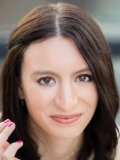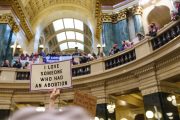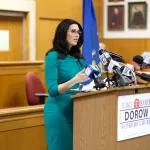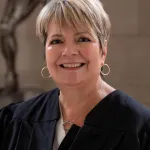Your trusted source for contextualizing politics news. Sign up for our daily newsletter.
MEQUON, Wisconsin — On Saturday morning in a suburb north of Milwaukee, former U.S. Attorney General Eric Holder impressed upon a group of local Democrats and volunteers gathered in a packed living room that, if they didn’t already know it, “the nation is looking at what’s going to happen here in Wisconsin.”
Holder was in the state stoking enthusiasm for Tuesday’s Supreme Court election between liberal Judge Janet Protasiewicz and conservative Dan Kelly, which will determine the partisan balance of the high court. Holder called that race and a special state Senate election in the Milwaukee suburbs between Republican Dan Knodl and Democrat Jodi Habush Sinykin, who was seated beside him, “the most important races of 2023.”
“The cavalry is not coming,” Holder warned, an April flurry of snowflakes falling onto the quiet street outside. “We are the cavalry. You all are the cavalry. You’re really soldiers in this fight for justice and equality.”
In living rooms, county party offices and rallies around the state, through snow, a tornado watch and bitterly cold temperatures the weekend before the election, Wisconsin Democrats and supporters of Protasiewicz framed the contest between her and Kelly, a former justice, as an existential fight.
The election isn’t just about one seat on the seven-member court, but about Wisconsin’s democracy itself and who belongs in it. The race, they say, is a singular opportunity for voters to reclaim power from legislators of the 19th century who passed an abortion ban that is currently blocking abortion access and the Republican legislators of the 21st century who have dominated state politics for over a decade.
-
Election results:
In Mequon that morning and at a canvass launch at the Waukesha County Democratic Party offices later that afternoon, Holder, now chair of the National Democratic Redistricting Committee, spoke about Wisconsin Democrats as continuing the fight of Union soldiers who fought at Gettysburg, the troops who stormed the beaches of Normandy and civil rights leaders who marched on Selma and Montgomery.
“Every generation of Americans has been called upon to defend democracy,” he said. “This can’t be the first generation that fails to do so.”
The technically nonpartisan race could shift the makeup of the court, dominated for years by conservatives, ahead of key decisions. In the coming months and years, Wisconsin’s high court could determine the fate of the 1849 abortion ban, the subject of a lawsuit from the state’s Democratic governor and attorney general; the state’s controversial, heavily lopsided legislative maps; and even disputes over the 2024 election.
GOP lawmakers have aggressively drawn legislative district lines, giving them a majority that’s not particularly responsive to the state’s closely divided electorate, which they used to undercut the power of Democratic Gov. Tony Evers after his 2018 election broke up Republicans’ trifecta.
“That Republican legislature is so insulated from electoral forces, and it’s proven so willing to use its power to not respond or adjust,” said Charles Franklin, Wisconsin pollster and director of the Marquette University Law School Poll. “Where is the public to go for small-d democratic responses for electoral issues? If they can reelect Evers but can’t change the composition of the legislature, it pushes the conflict to the courts.”
The two candidates and outside groups supporting them are framing the stakes of the race very differently. Protasiewicz, a liberal Milwaukee County judge, made a strategic decision to embrace the political ramifications head-on. She’s emphasized her beliefs in support of abortion rights throughout the campaign and critiqued the state’s political maps as “rigged,” drawing a rebuke from Kelly and conservative groups.
“I’ve been very clear about my values to the electorate because I think the electorate deserves to know what a person’s values are, rather than hiding them,” Protasiewicz said in the sole debate between her and Kelly in late March. “I’ve also been very clear that any decision that I render will be made based solely on the law and the constitution.”
Kelly has been endorsed by Susan B. Anthony Pro-Life America and the political arms of Wisconsin Family Action, Pro-Life Wisconsin and Wisconsin Right To Life. While Kelly has criticized abortion in earlier writings, he hasn’t publicly taken a position in this campaign. He has stressed judicial independence, saying in the debate, “I’m not a legislator, because I don’t talk about my politics.”
And instead of defending the status quo on abortion and the state’s maps, Kelly has attacked Protasiewicz’s judicial record and her sentencing decisions in cases involving defendants convicted of violent crime and attempted to paint her as “soft on crime,” which Protasiewicz has pushed back on in her ads.
A majority of Wisconsin voters support abortion being legal in most or all cases, Franklin noted.
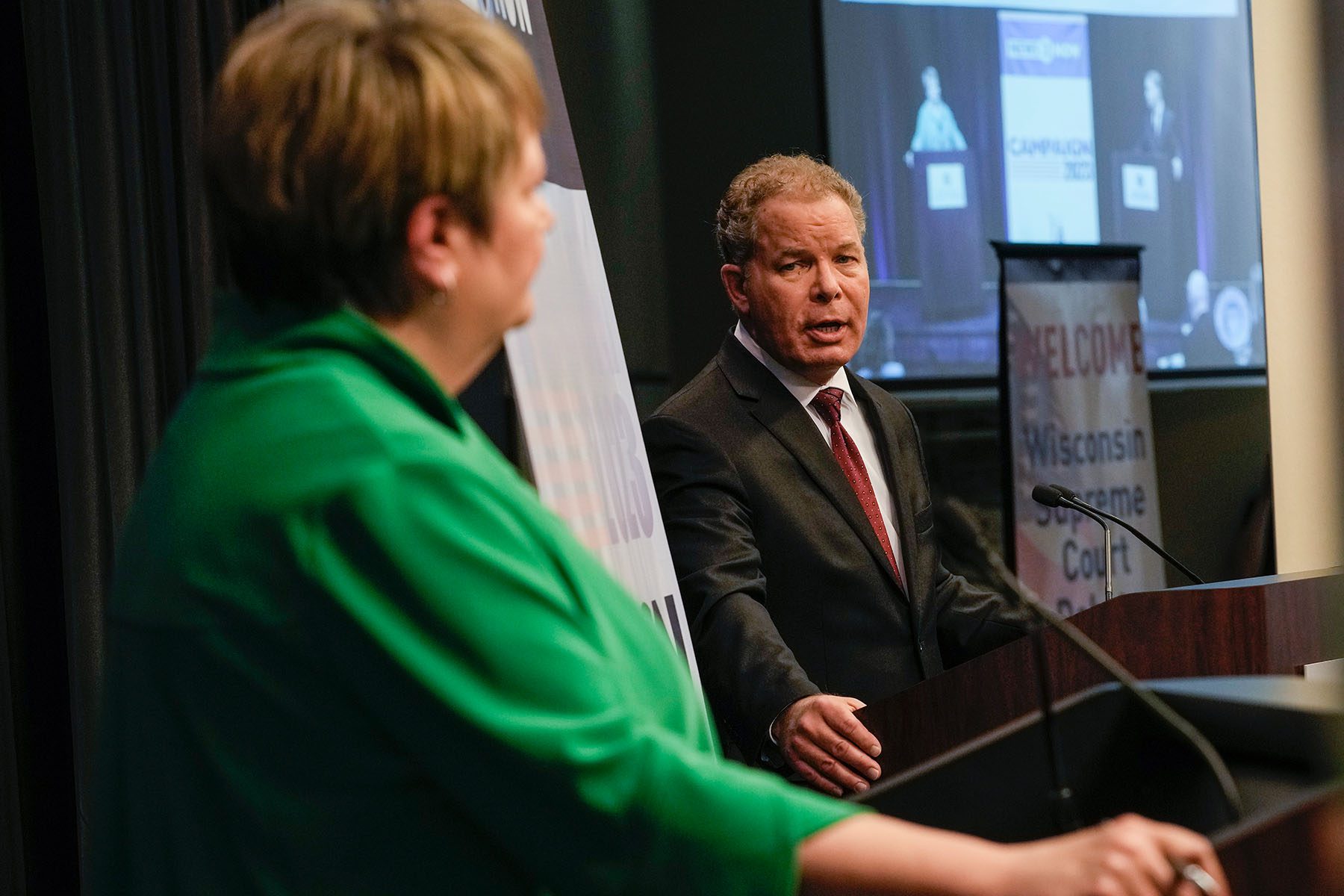
“I think he would be taking the short end of the stick here if he tried to argue about policy opposites of Protasiewicz,” Franklin said. “He is arguing policy opposites on crime because he’s not shy about talking about being tough on crime — as if that’s somehow not a policy.”
“We’re talking about what the Supreme Court actually does, they aren’t,” said a Democratic consultant and a senior adviser to the Protasiewicz campaign, who spoke on condition of anonymity to speak candidly about the race. “We aren’t bullshitting what the election is about.”
“There is some existentialness to this race,” added the adviser, who has worked on other winning liberal campaigns for the state Supreme Court. “Are we going to be a top-tier state, or are we going to become a backwater?”
Democrats in the state, including Sarah Godlewski, founder of Women Win Wisconsin and the state’s newly appointed Democratic secretary of state, hope that a Protasiewicz victory would both lead to the restoration of abortion access and continue to prove that abortion remains a mobilizing and winning issue.
“We’ve had 50 years to make Roe v. Wade the law of the land, but we didn’t prioritize it,” Godlewski said Saturday. “I believe we’ve learned that lesson, and history can repeat itself. It’s not a third- or fourth-tier issue — it is front and center, which is exactly where it should be.”
The high stakes have meant record-shattering fundraising, with more than $45 million so far in the race, driving public knowledge and voter engagement, observers say.
Wisconsin’s April Supreme Court races are difficult to poll because of typically low turnout. But based on early voting figures, Franklin estimates 1.3 million Wisconsinites will turn out to vote in the race. That would make it the second-highest turnout in a state Supreme Court race, below the 1.5 million votes cast in a 2011 race.
“I’m seeing more awareness this time around than I’ve seen in past cycles,” said Alicia Halvensleben, a local elected official in the Milwaukee suburb of Waukesha and chair of the 5th Congressional District Democrats. “Because so much money has been raised and we’re seeing more of these TV ads, people maybe are a little bit more aware — we don’t typically see this much money raised and these many ads on TV.”
A Protasiewicz win, she said, would “say a lot about the way that Wisconsin is trending . . . and about messaging that isn’t working from the other side.”
Chris Walton, former chair of the Milwaukee County Democratic Party, said the last few years “have been defeating” for Democrats in the state, despite some key wins and strong fundraising and party-building under party Chair Ben Wikler.
“If we don’t move forward, we’re gonna continue this path for another 10, 15, 20 years. And that’s going to be a detriment to the state of Wisconsin,” he said. “Every single state around the state of Wisconsin has marijuana legalized, except Wisconsin. Every state has a higher minimum wage, except Wisconsin. Everything good is nonexistent, everything bad continues to proceed.”
The Supreme Court race has also activated a class of OB/GYNs and medical students to get involved in politics, some for the first time. Over 300 medical professionals signed a letter, published as an ad in the Milwaukee Journal-Sentinel, supporting Protasiewicz.
“This election comes down to reproductive rights,” said Dr. Shefaali Sharma, a Madison OB/GYN and member of the Committee to Protect Health Care. “That is what is on the ballot. I don’t like it, I don’t like that we are being forced to essentially vote on a single issue, but that’s where we’re at. And it’s terrifying.”
Dr. Kristin Lyerly, an OB/GYN from Green Bay and member of the Committee To Protect Health Care, has been visible in supporting Protasiewicz and has appeared in a campaign ad for Habush Sinykin — a break from her own unsuccessful 2020 campaign for state assembly where she avoided discussing abortion altogether, she said.
“I wanted to distance myself from anything that was controversial, anything that could create problems for my campaign,” she said. “After Dobbs, it’s all about abortion.”
At two reproductive rights rallies over the weekend in downtown Milwaukee and the state capitol in Madison led by groups including Planned Parenthood Affiliates of Wisconsin and Women Win Wisconsin, women shared their stories of obtaining abortions before Roe v. Wade.
Doctors and abortion providers talked passionately with anger and sadness about being unable to provide care.
And medical students who want to become OB/GYNs openly discussed their worries about continuing their education and serving patients in a state that already had uneven access and gaps in reproductive health care before the Supreme Court overturned Roe v. Wade. The 1849 abortion ban is now standing in the way of their receiving training on abortions.
“This 1849 ban will lead to generations of doctors who do not know how to provide adequate abortion care, and it’s going to drive future physicians out of this state,” Samantha Crowley, a student at the University of Wisconsin School of Medicine and leader of the school’s chapter of Medical Students for Choice, said at Sunday’s rally. “How are we going to fix this? Voting on Tuesday for someone who will get into the Supreme Court and help us overturn this ban.”
Tamara Thompson, a Milwaukee-based doula and member of the Wisconsin Doulas of Color Collective who spoke at Saturday’s rally, said the abortion ban could drive not just medical professionals and aspiring abortion providers but women and potential parents to leave the state too.
“We have to respect that not everybody wants to be a lifelong struggle activist and fight against this system,” Thompson said. “Some people want joy and peace now, some people want rights and autonomy now, and they don’t want to have to wait for it.”
Lyerly, who was practicing at a Planned Parenthood clinic in Sheboygan when the Supreme Court overturned Roe v. Wade, is now practicing in rural Minnesota, where abortion is legal and protected under state law. She hopes that a Protasiewicz victory would allow her to return and practice again full-time in her home state.
“I’m a sixth-generation Wisconsinite. My whole family lives in Wisconsin. I belong in Wisconsin, and those are the people who I feel so entirely committed to taking care of,” she said. “It is my desperate dream to return to Wisconsin.”
The Supreme Court race, observers say, will determine not only the future of policy in Wisconsin but just how explicitly future judicial candidates can frame the stakes on the campaign trail.
“If Protasiewicz were to lose, that would be a huge signal to the way judges can campaign and the limits of it,” Franklin said. “On the other hand, if she should win, it certainly shows that making the courts about big policy issues can be a winning position — we’ll find out sometime Tuesday night.”

